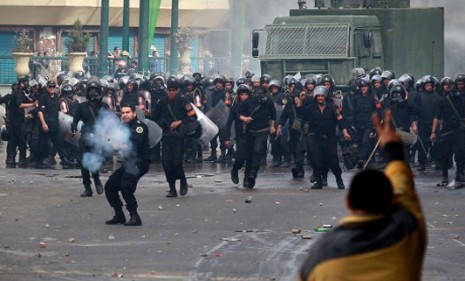Should the U.S. root for Egypt's rebels?
Egyptian protestors are calling for an end to President Hosni Mubarak's three-decade rule. Would that be the best result for America, too?

A free daily email with the biggest news stories of the day – and the best features from TheWeek.com
You are now subscribed
Your newsletter sign-up was successful
Egypt's anti-government protests intensified on Friday. Demonstrators calling for the ouster of longtime President Hosni Mubarak clashed with riot police, firing tear gas, rubber bullets, and water cannons. Mubarak's regime has tried to squelch protestors' ability to communicate with each other by shutting down internet connections and cellphone service, but organizers still managed to rally thousands in the streets of Cairo for what they dubbed "Angry Friday." The Obama administration is openly supporting demonstrations sweeping across the Arab Middle East, and Secretary of State Hillary Clinton urged the Egyptian government to "respond to the legitimate needs" of its people. Should the U.S. be doing more to help the protesters? (Watch Joe Biden's comments on the issue)
Yes, we should help push Mubarak out the door: "The people of Egypt are sick of Mubarak," says Barbara Slavin in AOL News, "and after 30 years they have every right to be." Mubarak has not been "a complete failure" — he has made "modest economic reforms," coordinated the fight against terrorists, and "maintained a cold peace with Israel." But the Egyptian people deserve more, and "Americans, of all people, should be on the right side of history and support the aspirations of Egyptians for peaceful political change."
"The U.S. should back Egypt's democrats"
The Week
Escape your echo chamber. Get the facts behind the news, plus analysis from multiple perspectives.

Sign up for The Week's Free Newsletters
From our morning news briefing to a weekly Good News Newsletter, get the best of The Week delivered directly to your inbox.
From our morning news briefing to a weekly Good News Newsletter, get the best of The Week delivered directly to your inbox.
Be careful what you wish for: Yes, Hosni Mubarak is "a de facto president-for-life" with a "track record of political suppression," says Ed Morrissey in Hot Air, so "it's almost impossible" for President Obama to endorse him. The trouble is, "if Mubarak falls, the result will almost certainly be either a seizure of power by the Muslim Brotherhood or a military coup." And "by signaling sudden distance between Mubarak and the U.S., "we could make an Islamist coup more likely, and that could unleash "a nightmare scenario for Israel."
"Uh oh: White House declines to endorse Mubarak in Egypt"
This is tricky, but Obama should do more: Yes, one reason we're so afraid of what will happen if Mubarak falls, says National Review in an editorial, is that his "sclerotic one-man rule" has "systematically neutered his organized democratic opposition, leaving the Islamists as the most obvious alternative to him." The Obama administration must make it abundantly clear to Mubarak that we'll only support him if he opens Egypt's political system, now. That way, change can come "gradually through the democratic process rather than all at once in the streets."
"Mubarak should go — but not yet"
A free daily email with the biggest news stories of the day – and the best features from TheWeek.com
-
 Why is the Trump administration talking about ‘Western civilization’?
Why is the Trump administration talking about ‘Western civilization’?Talking Points Rubio says Europe, US bonded by religion and ancestry
-
 Quentin Deranque: a student’s death energizes the French far right
Quentin Deranque: a student’s death energizes the French far rightIN THE SPOTLIGHT Reactions to the violent killing of an ultraconservative activist offer a glimpse at the culture wars roiling France ahead of next year’s elections
-
 Secured vs. unsecured loans: how do they differ and which is better?
Secured vs. unsecured loans: how do they differ and which is better?the explainer They are distinguished by the level of risk and the inclusion of collateral
-
 The billionaires’ wealth tax: a catastrophe for California?
The billionaires’ wealth tax: a catastrophe for California?Talking Point Peter Thiel and Larry Page preparing to change state residency
-
 Bari Weiss’ ‘60 Minutes’ scandal is about more than one report
Bari Weiss’ ‘60 Minutes’ scandal is about more than one reportIN THE SPOTLIGHT By blocking an approved segment on a controversial prison holding US deportees in El Salvador, the editor-in-chief of CBS News has become the main story
-
 Has Zohran Mamdani shown the Democrats how to win again?
Has Zohran Mamdani shown the Democrats how to win again?Today’s Big Question New York City mayoral election touted as victory for left-wing populists but moderate centrist wins elsewhere present more complex path for Democratic Party
-
 Millions turn out for anti-Trump ‘No Kings’ rallies
Millions turn out for anti-Trump ‘No Kings’ ralliesSpeed Read An estimated 7 million people participated, 2 million more than at the first ‘No Kings’ protest in June
-
 Ghislaine Maxwell: angling for a Trump pardon
Ghislaine Maxwell: angling for a Trump pardonTalking Point Convicted sex trafficker's testimony could shed new light on president's links to Jeffrey Epstein
-
 The last words and final moments of 40 presidents
The last words and final moments of 40 presidentsThe Explainer Some are eloquent quotes worthy of the holders of the highest office in the nation, and others... aren't
-
 The JFK files: the truth at last?
The JFK files: the truth at last?In The Spotlight More than 64,000 previously classified documents relating the 1963 assassination of John F. Kennedy have been released by the Trump administration
-
 'Seriously, not literally': how should the world take Donald Trump?
'Seriously, not literally': how should the world take Donald Trump?Today's big question White House rhetoric and reality look likely to become increasingly blurred